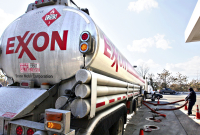Support strong Canadian climate journalism for 2025
The CEO of Imperial Oil said Wednesday he's confident that two multibillion-dollar oilsands projects facing regulatory review in Alberta will be approved, despite the NDP government's climate change policies which include a hard cap on overall greenhouse gas emissions.
Rich Kruger said the company's Aspen and Cold Lake Expansion projects in northern Alberta will use new technologies that mean they will be more energy efficient, use 25 per cent less water and produce 25 per cent lower emissions than most existing facilities.
"We're excited about (the projects) because, not only do we think we've developed technologies and know-how here that can compete in a lower-price world, but these projects really represent a step change improvement in greenhouse gas emissions relative to the industry standard," he said.
"We think these are exactly the type of projects that should be approved and supported in Alberta."
Last week, the Alberta government approved three new oilsands projects that would together produce as much as 95,000 barrels of bitumen per day and add 2.5 megatonnes per year of greenhouse gas emissions. They are the first approvals since it announced late last year a 100-megatonne annual cap on overall emissions from the oilsands — the industry already produces about 70 megatonnes.
Imperial applied to the Alberta Energy Regulator for permission to build Aspen in 2013 but filed a revised plan in the fall of 2015 to incorporate the new technology which adds solvents to steam injection to produce the heavy, sticky bitumen from wells. It has been testing the technology at a $50-million pilot project in the Cold Lake region since 2010.
Kruger said Aspen's first 75,000-barrel-per-day phase is expected to produce about 1.2 megatonnes of emissions annually.
Aspen, which includes a second 75,000-bpd phase, is expected to receive a regulatory ruling next year and would then be eligible for an investment decision by the company. The Cold Lake expansion, a 55,000-bpd project for which an application was filed last March, is expected to follow in 2018.
Bart Cahir, the senior vice-president of Imperial Oil's upstream division, said each project is expected to cost "a couple of billion" dollars, noting detailed estimates are not yet available.
Kruger says the projects would be profitable with benchmark oil prices in the US$50-$60 per barrel range. Neither is expected to be operational until 2020 at the earliest.






Comments